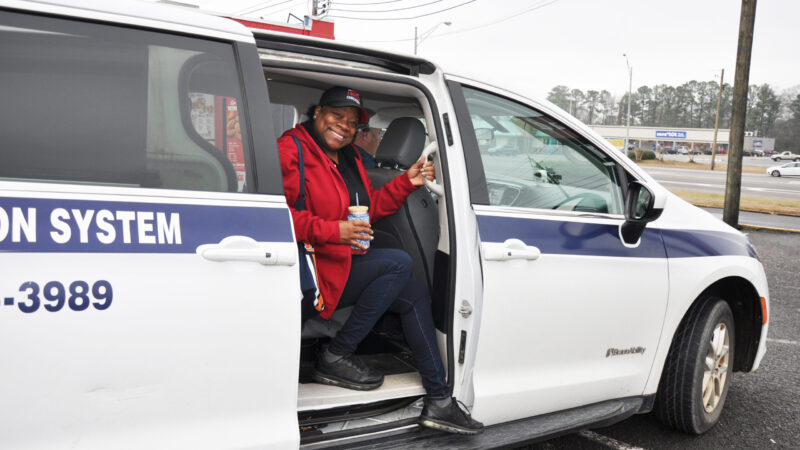Black Belt Poverty
Most people who’ve never been to Selma have one image of the place, from one day in history known as Bloody Sunday. 40 years ago, Martin Luther King Jr. and 600 men, women and children set out to march from Selma to Montgomery to demand justice and voting rights for black Americans. As they crossed the Edmund Pettis Bridge, on the south side of town, they were met by a sea of policemen, waving clubs and exploding canisters of tear gas. As white onlookers cheered, the marchers were brutally beaten. The event was captured on television for the nation to see.
That was a lifetime ago for many of Selma’s black residents. Today, the two-term mayor is an African-American, as is the Superintendent of Schools. But racial tension persists. Poor whites complain that black officials give jobs and other perks to friends and family. Poor blacks complain about a lack of jobs and health care. The unemployment rate, at about 10 percent, is twice the national average, and many folks in this town of about 20,000 say while they’re working, they’re not making a living wage.
“I’ve been looking for a job for a long time! This is my first job. It took me forever to find my first job.”
18-year-old Henry Murphy says he was willing to flip burgers, bus tables, stock shelves, whatever he could find. Finally, after months of applying for jobs, he got one ? as a landscaper for the city.
It’s brutal work in Alabama’s unrelenting sun. The digital sign at the bank on Main Street says 92 degrees, but it feels much hotter as Henry and the other landscapers dig hole after hole, filling them with zinnias and marigolds.
“Since I’m a beginner, we get paid by the month, so I get paid about 5-something a month.”
That’s about $500 a month for full-time work.
“There’s not a whole lot of good paying jobs here in Selma.”
48-year-old Linda Harrell is the landscape crew chief. She’s lived in Selma all her life.
“We still need jobs because we don’t have them here. We just don’t have a whole lot of jobs. A lot of things closing down, plants, stores, stuff like that.”
“I would say any community that is rural or especially in the Black Belt has a more difficult time marketing their community than say somebody in a metropolitan area.”
As President of the Selma’s Centre for Commerce, Wayne Vardaman markets the city to companies looking for a place to set up shop. He concedes, it’s not an easy job. He says it’s the classic Catch-22.
“It’s been difficult in those areas to go out and market ’em because you have a lot of poverty and with poverty you have a lot of people that are uneducated, mostly unskilled workforce, so.”
Selma has lost a lot of the higher paying jobs it used to have. Craig Air Force based closed in the late 1970’s and several manufacturing plants have moved south of the border, drawn by cheap labor.
Selma Mayor James Perkins says this all adds up to economic vulnerability.
“When the nation gets a cold we get pneumonia in the Black Belt and in Selma. When people stop spending money, from catastrophic events such as 9-11 and Enron and Anderson and the war in Iraq ? when the money starts to slow down and stop flowing, we really are aching in the area.”
There’s also the issue of geography. Selma is nowhere near I-65, the main highway that links the aeronautical mecca of Huntsville to the health care giant of Birmingham and the state capital of Montgomery. Again, Wayne Vardaman.
“The statistics say that 79 to 80 percent of all the companies, manufacturing companies, locate somewhere within five miles of an interstate. So looking at those numbers you already know that you’re at a disadvantage if you’re not on an interstate.”
Some people, like Mayor Perkins, says it’s no accident that the road bypassed Selma when it was built decades ago. He believes the decision was rooted in racism.
“When you look at the interstate system as an example, you can see where economic injustice took place in this region.”
While economic developers and elected officials talk about attracting new business to the region, some people in Selma are fighting to hold on to the traditional way of life.
Marshall Gill sits on the front porch of his ranch-style house on the outskirts of Selma, overlooking some of his 216 acres of farmland. Guineas cluck in the yard ? the security system of choice in the rural south. Gill’s been working the land as long as he can remember.
“I’m a cattle farmer and a row crop vegetable farmer.”
His says his parents farmed, as did his grandparents.
“and when I was a little boy we worked in tomato fields, watermelon field, corn fields and my mother came up, she followed in the footsteps, she was a farmer. And so, I love working the land. Lot of times it get rough and ain’t a lot of money, but I love working the land.”
It’s been a tough life. It’s hard for any small farmer to survive, but harder still for African American farmers. In 1997, a massive class-action lawsuit against the U.S. Department of Agriculture claimed decades of discrimination against black farmers when it came to handing out loans and other forms of aid. The USDA admitted wrongdoing and the suit was settled out of court., Still, many black farmers (and the Environmental Working Group) say restitution payouts have been slow in coming.
Marshall Gill says he can’t prove it’s because of discrimination, but he’s had trouble getting government support for improvements on his land.
“Putting down plastic, you know irrigation system. And they said they don’t have any money in the budget for it.”
The U-S-D-A says it’s taking the concerns of black farmers’ seriously and closely monitoring its agency that administers farm loans. In the meantime many black farmers found themselves unable to make a living and have left their farms. With them, a way of life is simply disappearing here in the Black Belt.
Despite the challenges, there are some hopeful signs in Selma. Mayor Perkins notes that state officials are now wooing companies to the region. And recently they’ve managed to lure an auto supply company to the area that will provide about 240 jobs. Political and social leaders here, both black and white, seem determined to forge ahead, the way they did after Bloody Sunday 40 years ago. With limited economic opportunities, lingering racial tension and a shrinking population, the town’s survival may depend on it.
Surgeon general nominee Means questioned about vaccines, birth control and financial conflicts
During a confirmation hearing, senators asked Dr. Casey Means about her current positions and her past statements on a range of public health issues.
Kalshi reveals insider trading case against editor for MrBeast
With prediction markets booming, so have concerns about insider trading. Now, Kalshi has disclosed its first public actions against accounts suspected of trading on confidential information.
Greetings from Jordan’s Wadi Rum desert, where patches of green emerge after winter rains
Wadi Rum's otherworldly landscape is where Star Wars movies and The Martian were filmed. In late winter, plants emerge in this desert — but some are toxic to camels, so their herders must protect them.
Lack of transportation keeps many Alabamians from working. Rural public transit programs are trying to help
While lack of transportation is a major employment barrier in Alabama, few people take public transit to work. That dynamic is even more pronounced in rural areas.
When a horse whinnies, there’s more than meets the ear
A new study finds that horse whinnies are made of both a high and a low frequency, generated by different parts of the vocal tract. The two-tone sound may help horses convey more complex information.
Hundreds of American nurses choose Canada over the U.S. under Trump
More than 1,000 American nurses have successfully applied for licensure in British Columbia since April, a massive increase over prior years.






